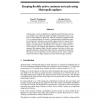Free Online Productivity Tools
i2Speak
i2Symbol
i2OCR
iTex2Img
iWeb2Print
iWeb2Shot
i2Type
iPdf2Split
iPdf2Merge
i2Bopomofo
i2Arabic
i2Style
i2Image
i2PDF
iLatex2Rtf
Sci2ools
109
click to vote
NIPS
2000
2000
Keeping Flexible Active Contours on Track using Metropolis Updates
Condensation, a form of likelihood-weighted particle filtering, has been successfully used to infer the shapes of highly constrained "active" contours in video sequences. However, when the contours are highly flexible (e.g. for tracking fingers of a hand), a computationally burdensome number of particles is needed to successfully approximate the contour distribution. We show how the Metropolis algorithm can be used to update a particle set representing a distribution over contours at each frame in a video sequence. We compare this method to condensation using a video sequence that requires highly flexible contours, and show that the new algorithm performs dramatically better that the condensation algorithm. We discuss the incorporation of this method into the "active contour" framework where a shape-subspace is used constrain shape variation.
Flexible Contours | Likelihood-weighted Particle Filtering | NIPS 2000 | NIPS 2007 | Video Sequence |
| Added | 01 Nov 2010 |
| Updated | 01 Nov 2010 |
| Type | Conference |
| Year | 2000 |
| Where | NIPS |
| Authors | Trausti T. Kristjansson, Brendan J. Frey |
Comments (0)

